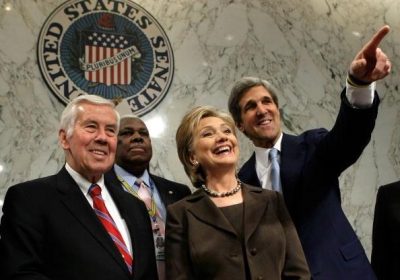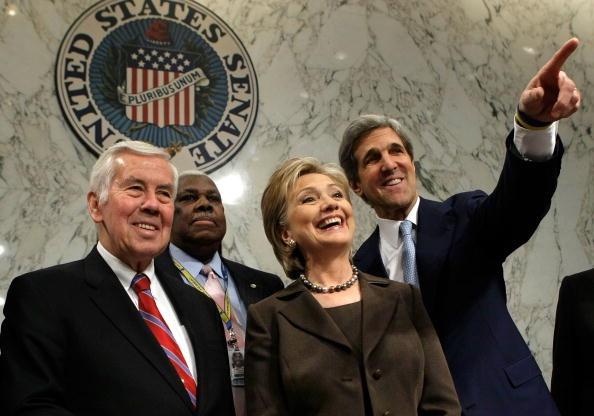 Passage of New START in a 14-4 vote out of the Senate Foreign Relations Committee is already being hailed by Democrats and arms control NGOs as a substantial victory. A floor vote for ratification is now apparently set to occur after the elections.
Passage of New START in a 14-4 vote out of the Senate Foreign Relations Committee is already being hailed by Democrats and arms control NGOs as a substantial victory. A floor vote for ratification is now apparently set to occur after the elections.
While ratification is by no means guaranteed, there are several clear winners already: Lockheed Martin, Northrop Grumman, Aerojet General, Alliant Techsystems, Los Alamos and Lawrence Livermore nuclear weapons laboratories, Y-12 nuclear labs, the Pentagon, and Bechtel Corporation.
While much noise has been made about the New START treaty’s cut to the nuclear weapons stockpile, the actual required reduction in arms may be as low as 8%, or 162 warheads out of a total of thousands. Furthermore, keep in mind too that this only affects deployed strategic warheads, not “tactical” weapons, and not weapons in the “reserve” stockpile.
So why the big deal? Why are both sides fighting like mad over a treaty that really requires virtually no change to the status quo US-Russia relationship and US nuclear stockpile?
Here’s why in a nutshell:
1. The Democrats, led by the Obama administration, want the treaty badly in order to prove that their means of combating proliferation and the rising power of states like Iran is better than the Republican strategy. The difference essentially is that the Democrats propose to give the impression that the USA is cutting its arsenal and seeking “global zero.” Of course it’s not and the Dems intend to fund the US nuclear complex at large levels. Long-range national security state doctrine calls for keeping nukes far into the future, and modernizing them the whole way along. But the Democratic foreign policy establishment thinks their plan will provide superior power, diplomatic and military, when dealing with nations that pose a threat to US imperial interests. It’s a tough balancing act, this anti-nuclear nuclearism! Thankfully the liberal militarists have found willing allies in the foundation community. Funds and NGOs like Ploughshares, American Friends Service Committee, and Peace Action West have lobbied extensively for ratification, proving that a little money goes a long way in politics.
2. The Republican strategy remains what the old gipper gave us — “peace through strength.” G. W. Bush pursued it with his aggressive nuclear weapons programs, but the Democrats managed to back him down. Undeterred, many Republicans think the Democrats are wasting the national security state’s time and energy and would just rather invest huge sums in weapons and invade and occupy nations as a first and early recourse when problems arise. There remains a great deal of ideological opposition to treaties, especially arms control pacts, whether or not they actually constrain US military might.
3. In addition to this acrimonious debate about imperial strategy, there’s bread and butter. While New START doesn’t pose any threats to any military funding whatsoever, it does offer a major opportunity to demand huge funding increases for several weapons programs.
A. Chief among these is the nuclear weapons program. New START ratification is being used as the primary forum in which to hash out the budget for nuclear weapons over the next ten years. Thus far supporters of the nuke complex have gotten a pretty good deal; a minimum $10 billion increase over the next ten years to build a new plutonium pit factory, new uranium plant, new weapons components factory, and other major capital projects. Corker and Isakson’s votes on September 16 to pass the treaty to the full Senate for a ratification vote may signal that they have received even larger funding commitments for the huge nuclear facilities in their states, or that they will use their vote on the floor to extort better deals between now and then.
B. Then there’s “missile defense” and “prompt global strike.” Missile defense has its own agency in the Pentagon and budget larger than the NNSA’s. Prompt global strike, a new conventional strategic weapons system capable of killing anyone on the planet in under an hour with hypersonic munitions, is a multi-hundred million dollar and growing program. Both are getting very large increases in Obama’s FY2011 budget, due in part to Republican demands that neither program be constrained by New START. Of course the treaty does no such thing, but the concern is really a theatrical way of demanding even larger increases for these weapons systems. The Democrats are too happy to oblige. Obama and Biden are champions of prompt global strike.
4. Thus the Senators on both sides of the debate are working for the nuclear weapons complex, Pentagon, and their powerful corporate contractors. The Democrats have already offered up major funding increases, even before Republican opposition. Conservatives have only pulled the issue further to the right, and arms control foundations and NGOs have fed the whole process by making New START out to be vastly more important and meaningful than it objectively is.
Still don’t see the bi-partisan consensus to fund the nuclear weapons complex and Pentagon’s missile defense and prompt global strike programs and contractors? Here’s some campaign finance data for the Senate Foreign Relations Committee members’ 2010 election cycle bank accounts. Both Democrats and Republicans are well endowed, demonstrating why the interests of the nuclear weapons complex and other weapons programs are absolutely not threatened by New START.
[The first number ranks the contributing corporation among the Senator’s top donors for 2010. Figures from http://www.opensecrets.org. Raytheon, Textron, Lockheed, Boeing, United Technologies, General Dynamics, Northrop Grumman, SAIC, Carlyle, BAE, and EADS all contract with the Missile Defense Agency and related Pentagon program offices. Lockheed serves at the lead contractor for prompt global strike. Bechtel, Honeywell, CH2M Hill, McDermott (through its BWXT subsidiary), URS, Flour, and Lockheed Martin contract with the NNSA to operate the US nuclear weapons complex. AECOM is subcontractor for the US nuclear weapons program.]
Democrats
John Kerry
20 Raytheon Co $15,250
84 Honeywell International $8,500
84 Textron Inc $8,500
Christopher J. Dodd
3 United Technologies $115,250
16 General Dynamics $29,300
Barbara Boxer
18 CH2M HILL $23,500
84 Lockheed Martin $10,300
89 Honeywell International $10,000
Robert Menendez
21 CH2M Hill $36,075
95 AECOM Technology Corp $17,200
Benjamin L. Cardin
41 Northrop Grumman $15,700
83 Lockheed Martin $11,000
Robert P. Casey Jr
5 SAIC Inc $20,000
8 Northrop Grumman $18,150
21 US Dept of Defense $10,800
24 McDermott International $10,000
48 Raytheon Co $8,250
Jeanne Shaheen
17 Honeywell International $16,000
Kirsten E. Gillibrand
59 BAE Systems $16,300
79 Carlyle Group $12,500
85 Raytheon Co $11,750
Republicans
Richard Lugar
24 Lockheed Martin $10,000
33 Raytheon Co $9,750
36 Bechtel Group $8,850
39 Honeywell International $8,500
Bob Corker
57 Honeywell International $15,000
85 US Government [partly Y-12] $12,650
Johnny Isakson
50 Boeing Co $10,000
50 Lockheed Martin $10,000
James E. Risch
5 URS Corp $12,700
12 Honeywell International $10,000
50 Bechtel Group $7,000
69 Boeing Co $5,000
Jim DeMint
13 URS Corp/Washington $16,499
18 Fluor Corp $14,250
25 Lockheed Martin $12,600
44 Boeing Co $10,201
91 Honeywell International $9,000
John Barrasso
15 Northrop Grumman $13,500
34 Honeywell International $10,000
96 URS Corp $6,000
Roger F. Wicker
14 Northrop Grumman $17,500
21 European Aeronautic Defence & Space $14,500
41 General Dynamics $11,000
47 Raytheon Co $10,000
James M. Inhofe
21 BAE Systems $12,700
27 Lockheed Martin $12,000
29 Boeing Co $11,750
48 Honeywell International $10,000
48 Northrop Grumman $10,000
48 Raytheon Co $10,000
48 United Technologies $10,000
Darwin BondGraham is a member of the Los Alamos Study Group. He’s also an ethnographer and historian with a degree in sociology. His current work focuses on economic and social development.
